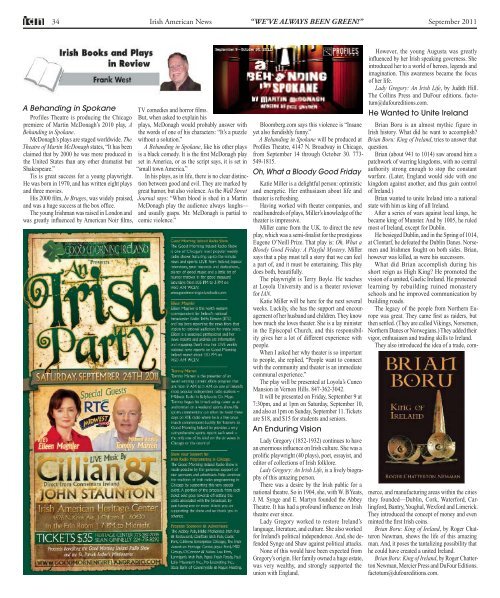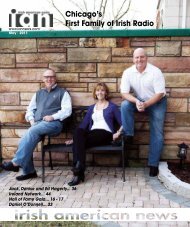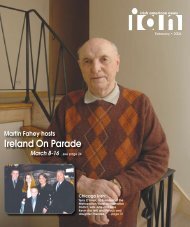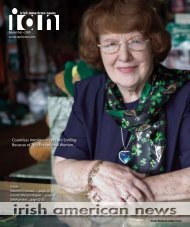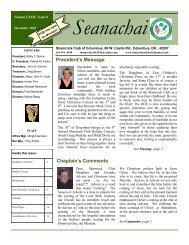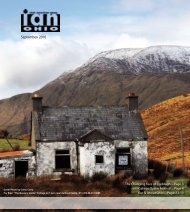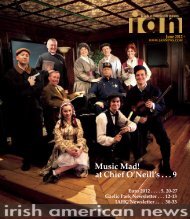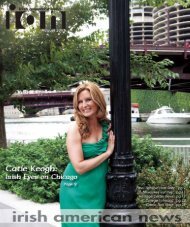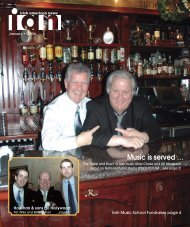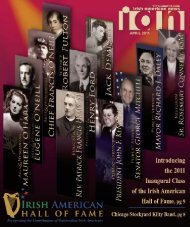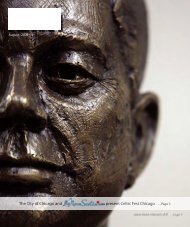September 2011 - Irish American News
September 2011 - Irish American News
September 2011 - Irish American News
- No tags were found...
You also want an ePaper? Increase the reach of your titles
YUMPU automatically turns print PDFs into web optimized ePapers that Google loves.
34 <strong>Irish</strong> <strong>American</strong> <strong>News</strong> “We’ve Always Been Green!” <strong>September</strong> <strong>2011</strong>A Behanding in SpokaneProfiles Theatre is producing the Chicagopremiere of Martin McDonagh’s 2010 play, ABehanding in Spokane.McDonagh’s plays are staged worldwide. TheTheatre of Martin McDonagh states, “It has beenclaimed that by 2000 he was more produced inthe United States than any other dramatist butShakespeare.”Tis is great success for a young playwright.He was born in 1970, and has written eight playsand three movies.His 2000 film, In Bruges, was widely praised,and was a huge success at the box office.The young <strong>Irish</strong>man was raised in London andwas greatly influenced by <strong>American</strong> Noir films,TV comedies and horror films.But, when asked to explain hisplays, McDonagh would probably answer withthe words of one of his characters: “It’s a puzzlewithout a solution.”A Behanding in Spokane, like his other playsis a black comedy. It is the first McDonagh playset in America, or as the script says, it is set in“small town America.”In his plays, as in life, there is no clear distinctionbetween good and evil. They are marked bygreat humor, but also violence. As the Wall StreetJournal says: “When blood is shed in a MartinMcDonagh play the audience always laughs—and usually gasps. Mr. McDonagh is partial tocomic violence.”Bloomberg.com says this violence is “Insaneyet also fiendishly funny.”A Behanding in Spokane will be produced atProfiles Theatre, 4147 N. Broadway in Chicago,from <strong>September</strong> 14 through October 30. 773-549-1815.Oh, What a Bloody Good FridayKatie Miller is a delightful person: optimisticand energetic. Her enthusiasm about life andtheater is refreshing.Having worked with theater companies, andread hundreds of plays, Miller’s knowledge of thetheater is impressive.Miller came from the U.K. to direct the newplay, which was a semi-finalist for the prestigiousEugene O’Neill Prize. That play is: Oh, What aBloody Good Friday: A Playful Mystery. Millersays that a play must tell a story that we can feela part of, and it must be entertaining. This playdoes both, beautifully.The playwright is Terry Boyle. He teachesat Loyola University and is a theater reviewerfor IAN.Katie Miller will be here for the next severalweeks. Luckily, she has the support and encouragementof her husband and children. They knowhow much she loves theater. She is a lay ministerin the Episcopal Church, and this responsibilitygives her a lot of different experience withpeople.When I asked her why theater is so importantto people, she replied, “People want to connectwith the community and theater is an immediatecommunal experience.”The play will be presented at Loyola’s CuneoMansion in Vernon Hills. 847-362-3042.It will be presented on Friday, <strong>September</strong> 9 at7:30pm, and at 1pm on Saturday, <strong>September</strong> 10,and also at 1pm on Sunday, <strong>September</strong> 11. Ticketsare $18, and $15 for students and seniors.An Enduring VisionLady Gregory (1852-1932) continues to havean enormous influence on <strong>Irish</strong> culture. She was aprolific playwright (40 plays), poet, essayist, andeditor of collections of <strong>Irish</strong> folklore.Lady Gregory: An <strong>Irish</strong> Life, is a lively biographyof this amazing person.There was a desire by the <strong>Irish</strong> public for anational theatre. So in 1904, she, with W. B Yeats,J. M. Synge and E. Martyn founded the AbbeyTheatre. It has had a profound influence on <strong>Irish</strong>theatre ever since.Lady Gregory worked to restore Ireland’slanguage, literature, and culture. She also workedfor Ireland’s political independence. And, she defendedSynge and Shaw against political attacks.None of this would have been expected fromGregory’s origin. Her family owned a huge estate,was very wealthy, and strongly supported theunion with England.However, the young Augusta was greatlyinfluenced by her <strong>Irish</strong> speaking governess. Sheintroduced her to a world of heroes, legends andimagination. This awareness became the focusof her life.Lady Gregory: An <strong>Irish</strong> Life, by Judith Hill.The Collins Press and DuFour editions. factotum@dufoureditions.com.He Wanted to Unite IrelandBrian Boru is an almost mythic figure in<strong>Irish</strong> history. What did he want to accomplish?Brian Boru: King of Ireland, tries to answer thatquestion.Brian (about 941 to 1014) saw around him apatchwork of warring kingdoms, with no centralauthority strong enough to stop the constantwarfare. (Later, England would side with onekingdom against another, and thus gain controlof Ireland.)Brian wanted to unite Ireland into a nationalstate with him as king of all Ireland.After a series of wars against local kings, hebecame king of Munster. And by 1005, he ruledmost of Ireland, except for Dublin.He besieged Dublin, and in the Spring of 1014,at Clontarf, he defeated the Dublin Danes. Norsemenand <strong>Irish</strong>men fought on both sides. Brian,however was killed, as were his successors.What did Brian accomplish during hisshort reign as High King? He promoted thevision of a united, Gaelic Ireland. He protectedlearning by rebuilding ruined monasteryschools and he improved communication bybuilding roads.The legacy of the people from Northern Europewas great. They came first as raiders, butthen settled. (They are called Vikings, Norsemen,Northern Danes or Norwegians.) They added theirvigor, enthusiasm and trading skills to Ireland.They also introduced the idea of a trade, commerce,and manufacturing areas within the citiesthey founded—Dublin, Cork, Waterford, Carlingford,Bantry, Youghal, Wexford and Limerick.They introduced the concept of money and evenminted the first <strong>Irish</strong> coins.Brian Boru: King of Ireland, by Roger ChatteronNewman, shows the life of this amazingman. And, it poses the tantalizing possibility thathe could have created a united Ireland.Brian Boru: King of Ireland, by Roger ChattertonNewman, Mercier Press and DuFour Editions.factotum@dufoureditions.com.


